
WEB MAIL BEACH
WEATHER HOTELS/MOTELS REAL ESTATE
VACATION
RENTALS RESTAURANTS
DINING OUR TOWNS FISHING - BOATING
CHARTER BOATS SHOPPING NIGHTLIFE THE OCEAN THE BAY
Atlantic Bottle Nosed Dolphin
Many days, they simply swim past, with only a fin bobbing up and down. Some days, though, you'll see a sizeable portion of their bodies as they splash their "flukes", or back fins, on the water. If you're lucky, you'll even catch them on those rare, playful occasions when they jump completely out of the water in a dramatic flip. My family revels in spotting the Atlantic Bottle Nosed Dolphins as they swim by. Both of our most memorable dolphin-watching moments have been caught on video. A few years ago, my father-in-law miraculously taped a dolphin flipping several feet out of the water. We'd never seen anything like it before and we haven't seen anything like it since. The other time, on a cruise on the tall ship Jolly Rover out of Lewes, we came on a school of dozens of dolphins playing off the point of Cape Henlopen State Park. Because we were under sail, the dolphins moved within just a few yards of the ship, giving the 50 passengers on board a lengthy, up-close view. One moment not caught on tape occurred last summer in the aftermath of one of August's many tropical storms and hurricanes. A teenage boy boogie boarding in Bethany Beach got the shock of a lifetime when, as he caught a wave, a dolphin almost brushed him as it swam through the wave. It scared the living daylights out of that kid, who thought for sure those fins belonged to something far more menacing than a dolphin. Of course, the one time we were really looking for dolphin, during the annual Mid-Atlantic Coastal Dolphin Count, we didn't spot a single one during our two-hour tour of duty at Fenwick Island State Park. What are Dolphins
Even the most brilliant of men failed to recognize that dolphins were a species of whales. Aristotle thought they were fish, though he did notice that they featured some mammal characteristics, such as hair, lungs, live birth and the nursing of calves. Dolphins are considered to be of the Toothed Whale class because they lack Baleen, a horny material similar to fingernails in composition that grows as fringed filter plates from the upper jaws. Other Toothed Whales include Sperm Whales and Pilot Whales. Scientists believe the ancestors of Bottle Nosed dolphins live on land. Believe it or not, blood chemistry studies have shown that dolphins are "artiodactyls", or cows and camels! In addition, x-rays of flippers and pectoral fins showed a bone structure similar to the human arm and hand. Dolphins are born with a small amount of hair on their beak, but in adulthood, only the hair follicles remain. Differences between Dolphins and PorpoisesPeople often confuse dolphins and porpoises. Marine mammologists have recognized about a half-dozen species of porpoises worldwide and only two inhabit United States waters. They have recognized, however, more than 30 species of dolphins, many of which can be found in U.S. waters. The main difference between the two is in the head area. Dolphins possess a "beak" and have a curved dorsal fin, while porpoises have a blunt head and a triangular dorsal fin. Dolphin Communication
While it is not known if dolphins have a formal language, they do communicate with a signature whistle to identify themselves. Unlike humans, dolphins lack vocal cords, but they do use a complicated system of whistles, squeaks, moans, trills and clicks produced by sphincter muscles within the blow hole. Using echolocation, or sonar, dolphins send out frequencies by clicking. The clicking sounds bounce off objects and the returning sound waves are picked up by the dolphin's bulbous forehead and lower jaw and interpreted as to distance, size and shape of object. This sound system is particularly useful at night or in murky waters such as the Delaware Bay as it allows the dolphin to navigate even if visibility is poor. Dolphins have produced sound frequencies from 0.25 to 200 kHz, using the higher frequencies for echolocation and the lower frequencies for communication and orientation. Dolphins: The Facts of LifeBottle Nosed dolphins move from the Mid-Atlantic in October and November to warmer waters in the south. Following are a number of other Facts of Dolphin Life: Dolphin Anatomy 101Dolphins have outstanding vision in and out of the water. In the water, their eyes are protected from the sea water by mucus secreted from glands at the outer corner of the eye. Their ears, small and hard to detect, are located just behind the eyes and have no flaps or lobes. The dolphin's swimming power comes from its caudal fluke, which moves up and down instead of side-to-side like fish. The dorsal fin provides stabilization and may also regulate body heat -- a dolphin's body heat is very close to human body heat at 97.7 degrees F (36.5 degrees C) What do dolphins eat?After feeding on mother's milk the first few weeks, calves begin eating fish at 3 to 4 months and are weaned at 12 to 18 months. Dolphins feed on all kinds of fish and crustaceans with adults eating 13 to 14 pounds of fish a day or 20 pounds or more in colder winter waters. How long do dolphins live?In captivity, dolphins have lived as long as 40 years. In the wild, though, scientists believe they only live 25 to 30 years. Dolphin reproductionMature female dolphins will give birth every 2 to 3 years and could give birth as many as eight times during their lifetimes. They can give birth at any time of year but most commonly calve in the spring and summer. Females mature sexually at 8 years of younger and dolphins are sexually promiscuous with males competing for females. How big are dolphins?Dolphin calves, usually born in the spring, are 2.5- to 3-feet long and 25- to 40-pounds. Feeding on its mother's milk, a calf will double in size in the first few weeks. Adult males are larger than females. The Mid-Atlantic dolphins will reach 7 to 10 feet in length and 300 to 500 pounds by their early teens. Do dolphins sleep?Traveling as much as they do, dolphins must rest some time. They don't sleep, though. They merely take cat naps at the ocean's surface for two or three minutes at a time. At night, those naps increase to seven or eight minutes. How often do dolphins surface?Because they lack nostrils like most marine mammals, dolphins surface every 15 to 20 seconds to clear their blow holes with a burst of air. They commonly dive 200 meters and can remain underwater for 8 to 10 minutes by slowing their heart beat and controlling their blood flow. Dolphins only breathe voluntarily rather than automatically like humans, so if they're knocked unconscious, they stop breathing. How fast do dolphins swim?Dolphins typically cruise at 5 to 7 miles per hour, but they have been clocked at 18 to 22 miles per hour with top speeds of 30 miles per hour. How do dolphins travel?Dolphins travel in pods of up to 15. A pod typically consists of several adult females, calves and adult males. Pods may travel together in herds of several hundred individuals. Dominance or aggression, in the form of a showing of teeth, tail smacking, jaw snapping or head butting, establishes the hierarchy in the pod. Dolphin Research
Numerous scientists have studied the physiology of dolphins to learn how they, as mammals, have adapted to diving, while others have tried to determine how intelligent they are. Some believe they are as intelligent as dogs and in some cases rival the intelligence of humans. The U.S. Navy has trained dolphins for locating and retrieving objects such as tools and equipment underwater. But dolphins' ability to communicate continues to intrigue researchers most. Dolphins have been trained to respond to hand gestures or even voice commands of up to three words such as "swim, hoop, jump." Dolphin Strandings
Instead, call authorities with the following information: Pinpoint the location -- How can the stranded animal be reached and what kind of vehicle will be needed to reach it? Determine the size and species if possible -- Whales have a horizontal fluke at right angles to the dorsal fin, while sharks have vertical tail fins in line with their dorsal fins. Note if it is a single or multiple stranding. Also, remember that dolphins are protected under the Marine Mammal Protection Act of 1972 and anyone caught with a marine mammal, dead or alive, or any part of a marine mammal, such as a tooth, is subject to a fine of up to $10,000 and one year in prison. If criminal intent is proven, the fine is $10,000 but the prison term can be up to 2 years with possible vessel seizure. Annual Dolphin Count
Volunteers place a sighting marker (a stick painted red on the end) in the sand near the water and count the number of dolphins that pass by. In addition to counting dolphins, the volunteers, assigned to posts all along the Maryland and Delaware coast, also note the weather conditions, water conditions, the direction of travel of the dolphins they see, human activity in the area, the number of newborn dolphin calves, or Neonates, vessel activity, and other possible factors such as fish and bird activity. Photo: Trying to peer through the mist and fog during the 1996 dolphin count at Fenwick Island State Park. Links: The National Aquarium in Baltimore |
If you would like your business listed on Beach-net Contact us here!
Delaware Web Design & Internet Advertising - Coastal Images Inc.
Home | The Ocean | The Bay | Things To Do at the Beach | Restaurants & Dining | Hotels - Motels & Lodging Shopping | Beach Directions |
Our Towns | Beach Real Estate & Vacation Rentals | What’s New
What's Here | Beach Weather | Our Advertisers | Beach Maps

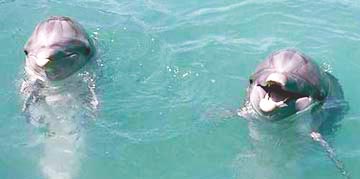 From the Webmaster: One of our family's favorite pasttimes when the water warms up in summer is watching for the Atlantic Bottle Nosed Dolphin, which can be seen nearly every day a hundred or so yards off the coast from Lewes, Delaware south to Ocean City, Maryland.
From the Webmaster: One of our family's favorite pasttimes when the water warms up in summer is watching for the Atlantic Bottle Nosed Dolphin, which can be seen nearly every day a hundred or so yards off the coast from Lewes, Delaware south to Ocean City, Maryland. Whales could hardly be considered common in the waters off the Maryland and Delaware coast, but one species of whale is common to this area -- the Atlantic Bottle Nosed Dolphin.
Whales could hardly be considered common in the waters off the Maryland and Delaware coast, but one species of whale is common to this area -- the Atlantic Bottle Nosed Dolphin. 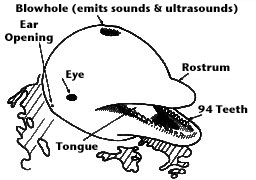 Bottle Nosed dolphins dominate many marine acts because of their intelligence and researchers believe much of the dolphin's brain is used for communication or "echolocation".
Bottle Nosed dolphins dominate many marine acts because of their intelligence and researchers believe much of the dolphin's brain is used for communication or "echolocation". 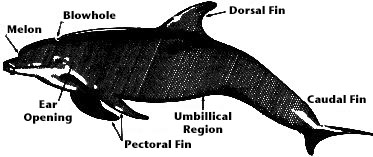
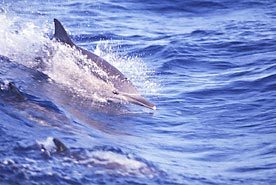 Dolphins are the most heavily researched of all whales with more than 300 in captivity in the United States alone. Most are on exhibition in aquariums, while others are in marine mammal research facilities at universities and private foundations.
Dolphins are the most heavily researched of all whales with more than 300 in captivity in the United States alone. Most are on exhibition in aquariums, while others are in marine mammal research facilities at universities and private foundations. 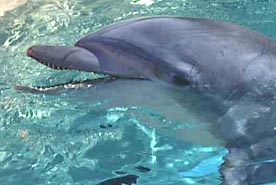 If you should come upon a stranded dolphin, you should not attempt to administer first aid yourself since you may harm the animal more than help it and since marine mammals, dead or alive, may pose a health hazard.
If you should come upon a stranded dolphin, you should not attempt to administer first aid yourself since you may harm the animal more than help it and since marine mammals, dead or alive, may pose a health hazard. 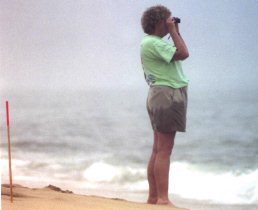 The annual Mid-Atlantic Coastal Dolphin Count occurs in July every year with volunteers counting dolphins for two hours on a Saturday morning throughout the region.
The annual Mid-Atlantic Coastal Dolphin Count occurs in July every year with volunteers counting dolphins for two hours on a Saturday morning throughout the region. 

